|
george orwell
|
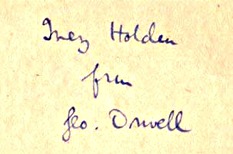
blaircowl.com
|
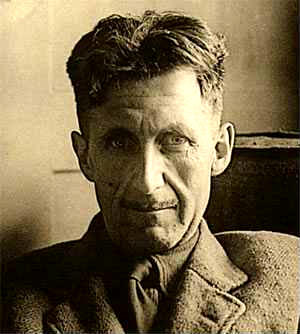 |
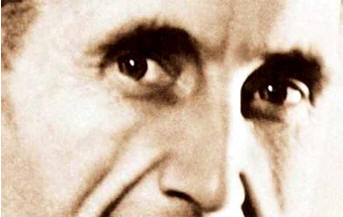
.
Letter to Gleb Struve
London: February 2, 1944
Gleb Struve papers
Hoover Institution Library
and Archives
hoover.org
|
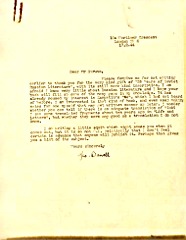
ingrandisci
|
All the war-propaganda
all the screaming and lies and hatred
comes invariably from people who are not fighting
homage to
catalonia - 1938
.
guerra fredda - cold war
termine di George Orwell che predisse
un periodo di 'orribile stabilità' e 'ansia nucleare' .
tribune 'you and the atomic bomb' 9.10.45 -
observer 10.3.1946
vanillamagazine.it - it.alphahistory.com - ticinolive.ch
.
.
WHY I WRITE
Ogni riga di ogni lavoro serio che ho scritto dal 1936 a questa parte
è stata scritta direttamente o indirettamente
contro il totalitarismo e a favore del socialismo
democratico. per come lo vedo io.
perché scrivo - 1946
Ciò che soprattutto ho
cercato di fare negli ultimi dieci anni è stato trasformare la scrittura
politica in arte. Il mio punto di partenza
è sempre un senso di partigianeria, un senso d'ingiustizia.
Quando mi accingo a scrivere un
libro io non mi dico 'Voglio produrre un'opera d'arte'
. Io scrivo perché c'è qualche bugia che voglio
smascherare, qualche fatto su cui voglio attirare l'attenzione, e il mio
primo pensiero è quello di farmi ascoltare.
oscarmondadori.it/orwell-letteratura-palestra-di-liberta
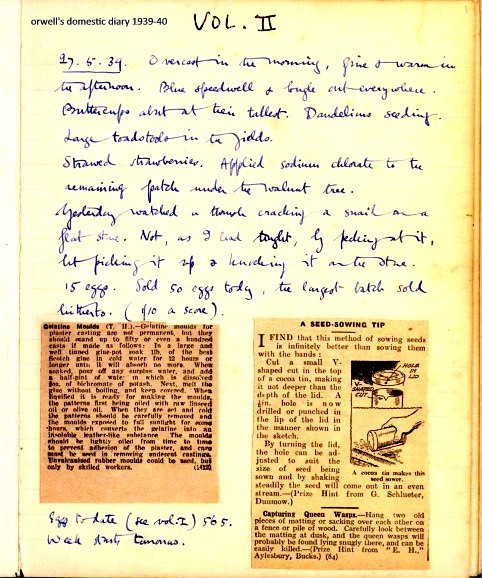 ingrandisci
ingrandisci
orwell's domestic diary 1939-40 - fb/go
George Orwel
Il regime che impedisce le libere comunicazioni e le relazioni tra i
cittadini azzera la creatività individuale. Solo quando si è liberi si può
dire la verità e la vita può essere onesta e dignitosa. Il potere
burocratico consegna “a una minoranza tirannica poteri tali che gli
inquisitori spagnoli non si sono mai sognati”. Così l’uguaglianza viene
uccisa da chi si sente più uguale degli altri e il principale piacere umano
consiste nel vincere e nel calpestare un nemico disarmato.
Damiano Mazzotti - italiacittadini.net -
agoravox.it
La forza dei bisogni e le ragioni della libertà - Franco Sbarberi
- 2009
Political language
-- and with variations this is true of all political parties
from Conservatives to Anarchists --
is designed to make lies sound truthful
and murder respectable and to
give an appearance of solidity to pure wind
GO - politics and the english language
- 1946
verso
una società orwelliana
Nuove minacce alla sfera privata -
Presto, gli USA registreranno le impronte digitali di tutti coloro che intendono
entrare nel paese (Keystone) La lotta contro il terrorismo e la
cyber-amministrazione sono dei potenziali pericoli per la protezione dei dati
personali. Nel suo rapporto annuale, l’Incaricato federale per la protezione dei
dati critica le misure di sicurezza decise dagli USA e chiede più vigilanza alle
autorità svizzere.
info.org
progetto grande fratello
- 2008
Orwell e le sue previsioni diventano realtà. E non solo
sul piccolo schermo attraverso l'invasione di reality-show ispirati al suo Big
Brother. Nel Regno Unito potrebbe partire un’operazione Grande Fratello, in
grado di ascoltare ogni telefonata, di leggere ogni sms o mail e di controllare
ogni sito visitato su internet dai sudditi della Corona.
quomedia.diesis.it
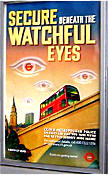
Londra - appaiono i manifesti
previsti da Orwell
Desta
sensazione l'affissione nella metropolitana londinese di una serie di poster che
promuovono la sicurezza che sarebbe garantita dal tecnocontrollo sulle persone.
Manifesti che a qualcuno mettono i brividi
George Orwell ne aveva parlato nel SUO ROMANZo più celebre: manifesti e slogan
piazzati un po' ovunque dal Governo, per ricordare ai cittadini ciò che è giusto
e ciò che è sbagliato, e che il controllo continuativo di un grande occhio,
quello di un grande fratello, è cosa buona e sana, e fa sentire tutti più
sicuri. Questo hanno pensato molti di coloro che si sono imbattuti in una nuova
serie di poster affissi sui muri della metropolitana londinese
punto-informatico.it
Hanspeter Thür
ritiene che la tecnologia attuale
permetta ormai una sorveglianza simile a quella descritta da George Orwell nel
SUO ROMANZo «1984»
Hanspeter Thür 1949 - avvocato svizzero - dal 2006
federale della protezione dei dati e della trasparenza.
rcsmediagroup.it
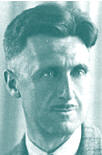
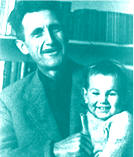
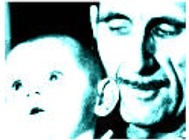
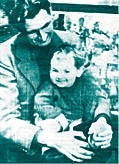
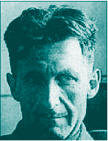
mostra fotografica di Vernon Richards
Half-Life 2. Il videogioco
Ambientato nella futuristica City 17, capitale di un mondo nel quale vige uno
stato di polizia voluto da Wallace Breen, ex Direttore di Black Mesa, Half-Life 2 trasporta il giocatore in un
universo alternativo che omaggia in maniera evidente 1984, IL ROMANZo capolavoro
di George Orwell. Qui, vestendo ancora una volta i panni di Gordon
Freeman, il giocatore deve scoprire da sé l’evoluzione della trama ...
pcprofessionale.it - 2010
|
1984
Nella Londra del 1984 non vi può essere spinta al consumismo
perché di fatto non c’è molto da consumare. La dittatura
presentata nel libro di Orwell è una dittatura il cui unico scopo
è quello di distruggere la memoria storica condannando i
cittadini a vivere in una sorta di eterno presente.
fantasymagazine.it
1984 - 2004 chronique de 20 années orwelliennes
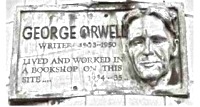
Les 20 années qui nous séparent de la référence mythique de 1984 valent bien
le demi-siècle qui nous sépare de la mort de Eric Blair dit George Orwell. En cette année du
centenaire de sa naissance, il nous apparaît tentant, avec toute la modestie qui sied à une
telle entreprise, de prolonger quelque peu les images qu'il a introduites dans la vision
collective de nombre d'entre nous.
arenotech.org
Will George
Orwell's 1984 Become A Reality In 2004?
It seems that the American people have foolishly bought
into the notion that any abridgement of freedom is justified as
long as the goal is "security." They obviously have forgotten
that a bird in a cage is secure, but it is hardly free.
covenantnews.com
because 2004 is 20 years too late
ORWELL DIVENTA REALTA'
George Orwell
sarebbe soddisfatto di fronte allo stato di video sorveglianza e di controllo
informatico raggiunto dall'Inghilterra negli ultimi tempi. Le sue preveggenze
sul possibile Grande Fratello del futuro, fino a qualche decennio fa invocate
come ancora futuribili, sembrano infatti divenute realtà in questa grande isola
oceanica. Se i dati sono attendibili - e non c'è motivo di dubitarne - la Gran
Bretagna attualmente può vantare la presenza del 20% di tutte le telecamere a
circuito chiuso installate nel mondo. Un monitoraggio massivo capace di spiare
al meno 300 volte al giorno i cittadini di sua maestà, le cui scelte in materia
di viaggi e di acquisti vengono controllati e conosciuti, mentre il Paese si
appresta ad introdurre scanner facciali negli aeroporti e nelle stazioni.
...
marzia bonacci - aprileonline.info
Grande Fratello in ufficio ?
Microsoft minimizza
Il brevetto di un software presentato da Microsoft
metterebbe a rischio la privacy dei dipendenti in azienda. Il colosso di
Redmond però si difende
L'occhio di Microsoft spierà i dipendenti in ufficio?
Microsoft contesta quanto scritto dal Times e afferma di avere a cuore
la difesa della privacy dei dipendenti.
Tuttavia un brevetto depositato da Microsoft fa
pensare proprio al Grande Fratello di George Orwell in 1984: la
tecnologia potrebbe monitorare come un occhio elettronica i dipendenti
sul posto di lavoro. Tuttavia Microsoft prende le distanze: il sistema
di monitoraggio, che sfrutta il controllo del battito cardiaco, della
temperatura corporea, dei movimenti, delle espressioni facciali e dela
pressione del sangue (attraverso sensori senza fili connessi tra Pc e
utenti), non è affatto creato per tenere sotto controllo i lavoratori.
Il sistema di software è in grado di monitorare capacità, produttività e
benessere psicofisico,
ma non si tratta di un Grande Fratello in ufficio.
VNUnet.it 17-01-2008
George
Orwell «spiato» dal Grande Fratello Dagli archivi di stato britannici: lo
scrittore fu sotto osservazione dei servizi britannici fino al 1948
COMBATTENTE -
I documenti datati 1937 registrano che lo scrittore era partito
per la Spagna per combattere al fianco del Poum, il partito operaio di
unificazione marxista spagnolo. Ma furono le sue attività durante il periodo di
lavoro presso la Bbc nel 1942 che allarmarono maggiormente le autorità. Orwell,
che per la Bbc curava il servizio in inglese rivolto all'India aveva tentato di
far assumere presso l'emittente un rinomato scrittore indiano marxista, Mulk Raj
Anand. Secondo i documenti degli archivi, Orwell era in quegli anni praticamente
senza soldi e «vestiva in uno stile bohemien sia al lavoro che nel tempo
libero». Orwell lasciò il suo posto alla Bbc nel 1943 e rimase sotto
osservazione dei servizi fino al 1948..... anno in cui fu dato alle stampe
«1984», l'opera orwelliana più nota e più preveggente.
corriere.it
La casa di Orwell spiata dal Grande
Fratello -
32 telecamere nello spazio di 180 metri
dall'abitazione.
Decine di telecamere a circuito
chiuso posizionate nel quartiere di Londra dove viveva il celebre
ROMANZIere
«Il Grande Fratello vi guarda» scriveva George Orwell nel 1948,
immaginando una società governata da un unico partito guidato – appunto
– dal Big Brother, capo supremo in grado di monitorare e spiare
costantemente la vita di ogni singolo cittadino. E oggi, a circa 60 anni
di distanza dalla pubblicazione DEL ROMANZo 1984, l'incubo del ROMANZIere
inglese è diventato realtà, perché proprio il suo vecchio quartiere
londinese è finito nel mirino di alcune delle numerose telecamere a
circuito chiuso cctv che sono state posizionate sul
territorio britannico in nome della sicurezza nazionale .
corriere.it
1984, George
odifreddi, orwell, Penguin, 1984, published in 1949
If you want a picture of the
future imagine a boot stamping on a human face -- for ever
1984 is one of the most famous
dystopias ever written (along with a predecessor like Brave New World or a
successor like The Handmaid's Tale). And with good reason -- this book is
incredibly intense. Orwell's picture of the future describes the boot and its
stamping of a human face in all the detail necessary to frighten everyone from
the pessimistic misanthropes to the idealistic optimists. Which camp would
Orwell himself belong to? Perhaps both. The book could only be written from the
most profound conviction that such a future could indeed happen, a conviction
motivated by societies where Big Brother already existed in large part when
Orwell wrote the book. But 1984 has become a touchstone of our culture in the
way that it functions as a warning. Can we prove the optimist in Orwell correct,
and proceed to take the book's warning as a corrective for certain tendencies in
our own society? We have survived the bloodiest century in human history without
the final annihilation of nuclear war, and without the kind of Big Brother
society envisioned by Orwell (although that is debatable). Frankly, that's not
much of an accomplishment to brag about, and a fresh re-reading of 1984 for
everyone on the eve of the new millennium might just help make a few things turn
out differently.
home.golden.net
Critical Essays on George Orwell's Stories
In his landmark novel entitled "1984 George
Orwell narrated grimly that "Ignorance is Strength." Of course, students of the
information age know only the opposite to be true: Knowledge is not only strength, it is power. Unfortunately, it is this very idea that leaves those
students who have little knowledge or understanding of Orwell's fiction ...
powerless to complete worthwhile term papers and essays on their own.
George-Orwell-Essays.Com comes to the rescue with DOZENS of examples of papers
and reports critically analyzing such classic works as 1984, Animal Farm,
Shooting an Elephant, and more!
Concept of War -
1984 & Animal Farm -
Similarities - Honesty & Conflict Shooting an Elephant
- 1984 - The Future Is Now
- Is It Here ?
george-orwell-essays.com
www.writework.com/essay/critical-analysis-george-orwell-s-essay-shooting-elephant
.
For at that time I had already made up my mind that imperialism was an evil
thing and the sooner I chucked up my job and got out of it the better.
Theoretically – and secretly, of course – I was all for the Burmese and all
against their oppressors, the British. As for the job I was doing, I hated it
more bitterly than I can perhaps make clear. In a job like that you see the
dirty work of Empire at close quarters. The wretched prisoners huddling in the
stinking cages of the lock-ups, the grey, cowed faces of the long-term convicts,
the scarred buttocks of the men who had been Bogged with bamboos – all these
oppressed me with an intolerable sense of guilt. But I could get nothing into
perspective.
.
That is
invariably the case in the East
a story always sounds clear enough at a
distance, but the nearer you get to the scene of events the vaguer
it becomes. Some of the people said that the elephant had gone in
one direction, , some said that he had gone in another, some
professed not even to have heard of any elephant.
.
When the white man turns tyrant, it is his
own freedom that he destroys
e allora
capii che, quando diventa tiranno, l'uomo bianco distrugge la sua stessa
libertà
.
And it is a great thing to die in
your own bed, though it is better still to die in your boots
.
In a Society in which there is
no law and in theory no
compulsion, the only arbiter of behaviour is public opinion. But
public opinion, because of the tremendous urge to conformity in
gregarious animals, is less tolerant than any system of law.
When human beings are governed by ‘thou shalt not’, the individual
can practise a certain amount of eccentricity: when they are
supposedly governed by ‘love’ or ‘reason’, he is under continuous
pressure to make him behave and think in exactly the same way as
everyone else .
.
He wears a mask, and his face grows to fit it
shooting an elephant - 1936
.
I should have to shoot the
elephant after all
The people expected it of me and I had got to do it. I
could feel their two thousand wills pressing me forward.
Irresistibly. For every writer, there comes a
moment when the will of the world presses you forward, so close that
you can feel their breath and words and sweat, tempting you to
shoot.
-GO
jiayang fan -
fb/thenewyorker - 2018
|
|
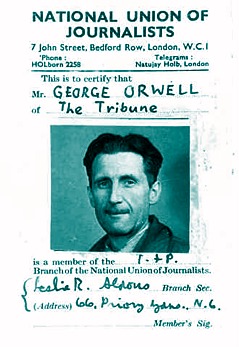
fb/go
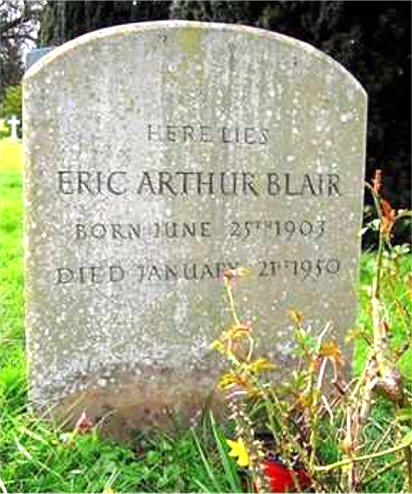
21.1.1950 - 46 anni
|
acceptance
For the ordinary man is passive. Within a narrow
circle (home life, and perhaps the trade unions or local politics) he feels
himself master of his fate, but against major events he is as helpless as
against the elements. So far from endeavoring to influence the future, he simply
lies down and lets things happen to him. Language ought to be the joint creation of poets
and manual workers.
cyber-nation.com
- george-orwell.com
www.quotationspage.com/quotes/George_Orwell
men can only be happy when they do
not assume
that the object of life is happiness
the quickest way to end a war is
to lose it
thoughtcrime
was not a thing that
could be concealed forever.
You might dodge successfully
for a while
even for
years
but sooner or later
they were bound to get you
1984
a humanitarian is always a
hypocrite
cp-tel.net - netcharles.com
|
Orwell dice che molti libri,
per quanto tu li legga con calma e pazienza, non ti danno niente. Di questi
libri, dice Orwell, il recensore dovrebbe scrivere: “questo libro non mi
interessa in alcun modo, e non ci scriverei sopra se non fossi pagato per
farlo”.
filter - caminadella.wordpress.com
Confessions of a Book Reviewer - george
orwell
In a cold but stuffy bed-sitting room littered with cigarette ends and
half-empty cups of tea, a man in a moth-eaten dressing-grown sits at a rickety
table, trying to find room for his typewriter among the piles of dusty papers
that surround it. He cannot throw the papers away because the wastepaper basket
is already overflowing, and besides, somewhere among the unanswered letters and
unpaid bills it is possible that there is a cheque for two guineas which he is
nearly certain he forgot to pay into the bank. There are also letters with
addresses which ought to be entered in his address book. He has lost this
address book, and the thought of looking for it, or indeed of looking for
anything, afflicts him with acute suicidal impulses.
He is a man of thirty-five, but looks fifty. He is bald, has varicose veins and
wears spectacles, or would wear them if his only pair were not chronically lost.
If things are normal with him he will be suffering from malnutrition, but if he
has recently had a lucky streak he will be suffering from a hangover. At present
it is half past eleven in the morning, and according to his schedule he should
have started work two hours ago; but even if he had made any serious effort to
start he would have been frustrated by the almost continuous ringing of the
telephone bell, the yells of the baby, the rattle of an electric drill out in
the street, and the heavy boots of his creditors clumping up and down the stairs.
The most recent interruption was the arrival of the second post, which brought
him two circulars and an income-tax demand printed in red.
Needless to say this person is a writer. He might be a poet, a novelist, or a
writer of film scripts or radio features, for all literary people are very much
alike, but let us say that he is a book reviewer. Half hidden among the pile of
papers is a bulky parcel containing five volumes which his editor has sent with
a note suggesting that they ‘ought to go well together’. They arrived four days
ago, but for forty-eight hours the reviewer was prevented by moral paralysis
from opening the parcel. Yesterday in a resolute moment he ripped the string off
it and found the five volumes to be Palestine at the Cross Roads, Scientific
Dairy Farming, A Short History of European Democracy (this one 680 pages and
weighs four pounds), Tribal Customs in Portuguese East Africa, and a novel, It’s
Nicer Lying Down, probably included by mistake. His review — 800 words, say —
has got to be ‘in’ by midday tomorrow.
Three of these books deal with subjects of which he is so ignorant that he will
have to read at least fifty pages if he is to avoid making some howler which
will betray him not merely to the author (who of course knows all about the
habits of book reviewers), but even to the general reader. By four in the
afternoon he will have taken the books out of their wrapping paper but will
still be suffering from a nervous inability to open them. The prospect of having
to read them, and even the smell of the paper, affects him like the prospect of
eating cold ground-rice pudding flavoured with castor oil. And yet curiously
enough his copy will get to the office in time. Somehow it always does get there
in time. At about nine p.m. his mind will grow relatively clear, and until the
small hours he will sit in a room which grows colder and colder, while the
cigarette smoke grows thicker and thicker, skipping expertly through one book
after another and laying each down with a final comment, ‘God, what tripe!’ In
the morning, blear-eyed, surly and unshaven, he will gaze for an hour or two at
a blank sheet of paper until the menacing finger of the clock frightens him into
action. Then suddenly he will snap into it. All the stale old phrases — ‘a book
that no one should miss’, ‘something memorable on every page’, ‘of special value
are the chapters dealing with, etc. etc.’ — will jump into their places like
iron filings obeying the magnet, and the review will end up at exactly the right
length and with just about three minutes to go. Meanwhile another wad of
ill-assorted, unappetizing books will have arrived by post. So it goes on. And
yet with what high hopes this downtrodden, nerve-racked creature started his
career, only a few years ago.
Do I seem to exaggerate? I ask any regular reviewer — anyone who reviews, say, a
minimum of a hundred books a year — whether he can deny in honesty that his
habits and character are such as I have described. Every writer, in any case, is
rather that kind of person, but the prolonged, indiscriminate reviewing of books
is a quite exceptionally thankless, irritating and exhausting job. It not only
involves praising trash — though it does involve that, as I will show in a
moment — but constantly inventing reactions towards books about which one has no
spontaneous feelings whatever. The reviewer, jaded though he may be, is
professionally interested in books, and out of the thousands that appear
annually, there are probably fifty or a hundred that he would enjoy writing
about. If he is a top-notcher in his profession he may get hold of ten or twenty
of them: more probably he gets hold of two or three. The rest of his work,
however conscientious he may be in praising or damning, is in essence humbug. He
is pouring his immortal spirit down the drain, half a pint at a time.
The great majority of reviews give an inadequate or misleading account of the
book that is dealt with. Since the war publishers have been less able than
before to twist the tails of literary editors and evoke a paean of praise for
every book that they produce, but on the other hand the standard of reviewing
has gone down owing to lack of space and other inconveniences. Seeing the
results, people sometimes suggest that the solution lies in getting book
reviewing out of the hands of hacks. Books on specialized subjects ought to be
dealt with by experts, and on the other hand a good deal of reviewing,
especially of novels, might well be done by amateurs. Nearly every book is
capable of arousing passionate feeling, if it is only a passionate dislike, in
some or other reader, whose ideas about it would surely be worth more than those
of a bored professional. But, unfortunately, as every editor knows, that kind of
thing is very difficult to organize. In practice the editor always finds himself
reverting to his team of hacks — his ‘regulars’, as he calls them.
None of this is remediable so long as it is taken for granted that every book
deserves to be reviewed. It is almost impossible to mention books in bulk
without grossly overpricing the great majority of them. Until one has some kind
of professional relationship with books one does not discover how bad the
majority of them are. In much more than nine cases out of ten the only
objectively truthful criticism would be ‘This book is worthless’, while the
truth about the reviewer’s own reaction would probably be ‘This book does not
interest me in any way, and I would not write about it unless I were paid to.’
But the public will not pay to read that kind of thing. Why should they? They
want some kind of guide to the books they are asked to read, and they want some
kind of evaluation. But as soon as values are mentioned, standards collapse. For
if one says — and nearly every reviewer says this kind of thing at least once a
week — that King Lear is a good play and The Four Just Men is a good thriller,
what meaning is there in the word ‘good’?
The best practice, it has always seemed to me, would be simply to ignore the
great majority of books and to give very long reviews — 1,000 words is a bare
minimum — to the few that seem to matter. Short notes of a line or two on
forthcoming books can be useful, but the usual middle-length review of about 600
words is bound to be worthless even if the reviewer genuinely wants to write it.
Normally he doesn’t want to write it, and the week-in, week-out production of
snippets soon reduces him to the crushed figure in a dressing-grown whom I
described at the beginning of this article. However, everyone in this world has
someone else whom he can look down on, and I must say, from experience of both
trades, that the book reviewer is better off than the film critic, who cannot
even do his work at home, but has to attend trade shows at eleven in the morning
and, with one or two notable exceptions, is expected to sell his honour for a
glass of inferior sherry
1946
george-orwell.org/Confessions_of_a_Book_Reviewer/0.htm
orwell.ru |
Nessuno è
patriottico quando si tratta di pagare le tasse
Towards the government I feel no
scruples and would dodge paying the -income-
tax if I could. Yet I would give my life for England readily enough, if I
thought it necessary. No one is patriotic about taxes.
wartime
diary
8.9.1940
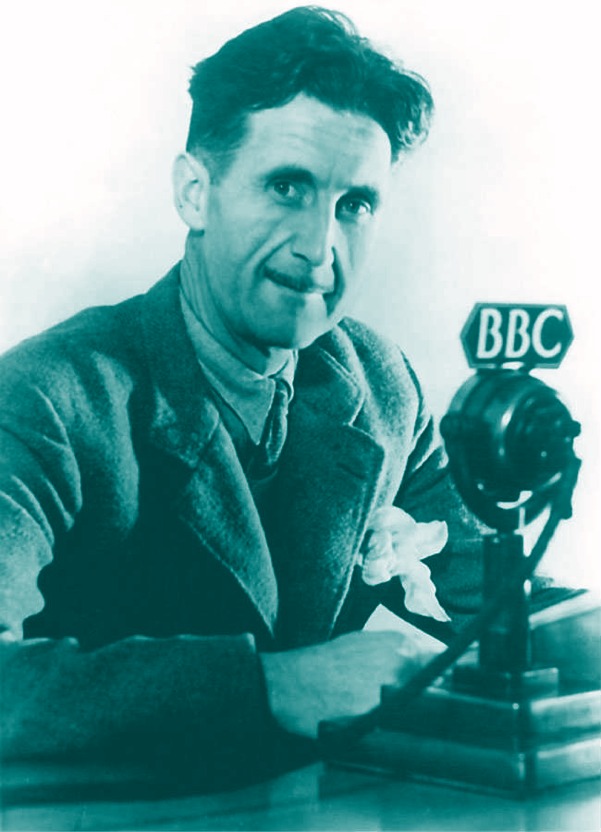
ORWELL 1984
l’ultimo uomo in europa
'
Se si elimina la libertà di parola le facoltà creative inaridiscono
'
Il mondo del 1984 è diviso in tre superstati: Oceania,
Eurasia ed Estasia. Londra fa parte di Oceania, ed è sottoposta alla dittatura
del SOCING (Socialismo inglese), il Partito unico
guidato dal Grande Fratello.
La popolazione è
divisa in tre gruppi: i membri del Partito Interno (il centro del potere 2%), i membri del Partito Esterno (addetti ai servizî 13%) ed i prolet
(85% della popolazione), ma questi non
contano.
La realtà
non esiste: è continuamente modificata secondo le esigenze del Partito.I membri del Partito Esterno, sono costantemente controllati da uno schermo - sempre presente
nelle loro abitazioni - che mentre mostra immagini di guerra, comunicati sociali e
politici, simultaneamente trasmette alla Psicopolizia qualsiasi suono e gesto. Manca lo
zucchero, il pane, il caffè, le lamette da barba, il sapone. C’è la
tubercolosi, il vaiolo, il rachitismo. Tutti I membri del Partito si chiamano fratelli,
indossano uniformi uguali ed hanno un incubo
comune: lo psicoreato, il delitto di pensiero. In
questo mondo, dove le sole cose in cui rifugiare la propria disperazione sono sigarette e gin marca
Victory, due membri del Partito Esterno, Winston e Julia, la cui unica
colpa è l’amarsi, sperano di poter sfuggire all’onnipresente controllo della psicopolizia.
nemesi.net -
heytherewildflower.wordpress.com
http://biografieonline.it/biografia.htm?BioID=193&biografia=George+Orwell
DORMIVA CON UNA PISTOLA SOTTO IL CUSCINo
Animal Farm had been a huge success and was
hated by the left because it exposed their terror tactics.
They wanted to know what Orwell was writing about next.
If Orwell was paranoid about being assassinated who could blame him? He
feared for his safety to the extent that he slept with a loaded Luger
Parabellum pistol under his pillow at Barnhill .
mike - merritt -
sundaypost.com/fp/1984
- 2019
incerto sul titolo
- '1984' ? - 'l'ultimo uomo in
europa' ? - vedi letterA
ALL'EDITORE
1984 -
grande fratello - divento film proprio nel 1984
2012 - Noah Oppenheim - FILM - nuovo adattamento di 1984
1984 diventa un
nuovo film - regista Paul Greengrass
Il vizio del fumo contribuì probabilmente alla sua costituzione e al suo
aspetto scarno ed esangue. Forse a causa proprio delle malattie
respiratorie infantili, Orwell sviluppò una bronchiettasia, una
condizione patologica caratterizzata dalla dilazione perpetua dei
bronchi con conseguenti, ripetuti attacchi di tosse. Dopo il 1938 gli fu
diagnosticata la tubercolosi, che lo portò alla morte nel 1950. Secondo
John Ross, lo scrittore potrebbe essere stato infettato in gioventù nel
Sud-Est asiatico, sotto le armi in Spagna (dove militò nelle armate
repubblicane contro le falangi di Franco e fu corrispondente per l'Observer)
oppure durante gli anni di vagabondaggio e povertà in Francia e in
Inghilterra.
La sua cattiva salute e la sua presunta sterilità (testimoniata dalle
sue lettere e da alcuni referti medici) contribuirono forse allo
sconforto persistente delle sue opere, dominate da un'atmosfera tetra e
opprimente.
Orwell stesso
disse ai suoi amici che 1984 sarebbe stato meno cupo se lui non fosse
stato così malato
giovanni
de matteo -
fantascienza.com
NASCE IN INDIA UN MUSEO IN ONORE DI GEORGE ORWELL
Lo scrittore britannico George Orwell visse solo il primo anno della sua vita in
India, ma la cittadina che lo ha visto nascere intende adesso dedicare un museo
all’ autore del profetico ‘1984’ e della ‘ Fattoria degli animali’. In realtà, come sottolinea la stampa locale, fino a poco tempo fa
i 150.000 abitanti di Motihari, sperduta nello Stato del Bihar e a circa 19 ore
di viaggio in treno da New Delhi, erano in buona parte all’oscuro di essere
concittadini di Orwell (vero nome: Eric Arthur Blair), nato ‘in loco’ il 25
giugno 1903 da un funzionario del Servizio coloniale britannico. La ‘scoperta’ è
stata fatta un anno fa, quando studiosi e giornalisti si sono riversati a frotte
a Motihari in occasione del centenario della nascita dello scrittore. Da allora
i residenti hanno pensato di poter sfruttare, anche dal punto di vista
turistico, il legame con Orwell e di restaurare con finanziamenti locali la casa
dove nacque, andata quasi completamente in rovina, per insediarvi un museo. È un tributo a un grande scrittore del XX secolo, anche se
Orwell lasciò l’India nel 1904 per non ritornarvi mai più fino alla morte,
avvenuta nel 1950. Una sola volta provò a rientrare nel Paese di nascita, nel
1921, chiedendo di essere arruolato nella polizia imperiale indiana, ma la
richiesta fu respinta, forse a causa delle sue simpatie per il Congresso,
partito politico di sinistra.
misna - spiritualsearch
- 2004
Orwell
... ! ... but
why ?
- short
film - special tribute to orwell
The short film is the first ever documentary
made on the writer’s birthplace.
For many years this part of his life was not known to the
local residents until renowned British journalist Ian Jan discovered
the birthplace in 1983.
rahi gaikwad - thehindu.com -
photo ranjeet kumar -
2014

George Orwell's birthplace in India set to become a museum
"The people of Motihari do not realise that even
if Orwell was an Englishman, he was anti-imperialist and wrote against colonial
exploitation," said Bishwajeet Mookherjee. "I made the film to educate Biharis
about Orwell, to tell them that a great writer was born in my home town. It's
only right that we should honour his memory."
maseeh rahman/guardian.com - fb/go - 2014
La casa natale in
India sarà restaurata e trasformata in un museo
dedicato alla vita e all'opera dello scrittore inglese.
Orwell vide la luce in bungalow coloniale nella
remota cittadina di Motihari, nello stato del Bihar, nel nord dell'India, dove
il padre del futuro romanziere lavorava per conto del governo britannico al
controllo della produzione di oppio. Oggi
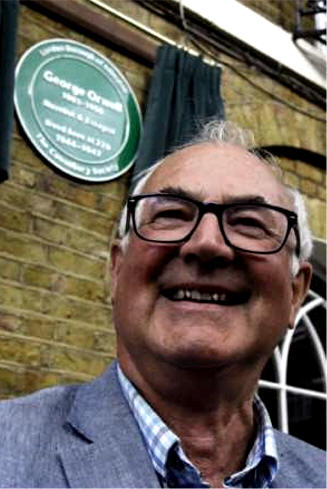 quell'edificio fatiscente è in rovina
e rischia di crollare, ragion per cui il governo del Bihar ha deciso di
intervenire rapidamente per salvare questo luogo narrato dallo stesso Orwell nei
suoi libri. quell'edificio fatiscente è in rovina
e rischia di crollare, ragion per cui il governo del Bihar ha deciso di
intervenire rapidamente per salvare questo luogo narrato dallo stesso Orwell nei
suoi libri.
Le tre stanze del bungalow ospiteranno
manoscritti, lettere, diari e fotografie che
saranno fornite dal George Orwell Archive dell'University College di Londra, che
conserva gli originali. La notizia è stata salutata con "grande piacere ed
emozione" dal figlio, Richard Blair.
"Sono felice che la casa natale di mio padre sia
restaurata e poi trasformata in un museo, un museo che sarà l'unico del genere
nel mondo", ha detto il figlio dello scrittore alla stampa inglese. "Per decenni
la casa ha versato in pessime condizioni e ora posso solo applaudire il sostegno
che il governo del Bihair fornirà al progetto del museo".
adnkronos - 2014 -
www.thecitizen.in/George-Orwells-Birthplace-in-Motihari-to-Turn-Museum
.
Richard Blair
the adopted son of George Orwell
- unveiling a new plaque in Canonbury Square where he lived for three
years - 1945-1947 .
morris - islingtongazette.co.uk - 2016
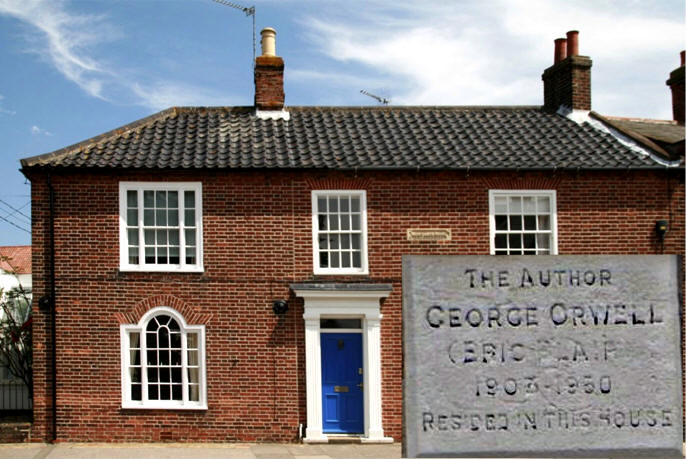 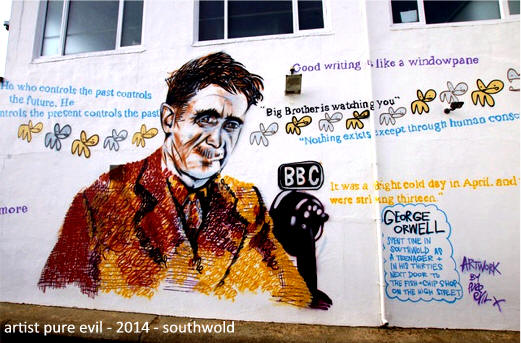
.
Southwold - Montague House in High Street was the
family home of George Orwell from 1932 to 1939 .
The Grade II-Listed house, which is privately
owned, already has a plaque in place to recognise his residence there,
but the Orwell Society has now submitted an application for a
fresh plaque because the old one is crumbling.
jason
noble - eadt.co.uk - 2018
.
murale dell'artista pure evil del 2014 a southwold
.
.
L'esperienza mi aveva insegnato molto presto che possiamo commettere degli
errori
indipendentemente dalla nostra volontà e poco tempo dopo imparai anche
che possiamo commettere degli errori senza neanche capire cosa abbiamo fatto
e perché siano errori
.
altri autori
 home home
|


















